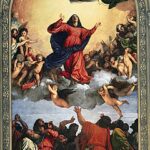Homily – Fr. Michael Casagram – Assumption of Mary – 8/15/24
 +MARY’S ASSUMPTION BODY AND SOUL INTO HEAVEN 15th August 2024
+MARY’S ASSUMPTION BODY AND SOUL INTO HEAVEN 15th August 2024
Today’s solemnity speaks to the hearts of us all for it holds promise for the future of each one of our lives. Six of our brethren have made their solemn profession on this Solemnity and each of our Cistercian monasteries of women or men have been dedicated to the Holy Mother of God. “May the Blessed Virgin Mary who was taken up into heaven, the life and sweetness and hope of all earthly pilgrims, never be far from their hearts” our hearts as is said in our Constitutions.
Our scripture readings this morning cover the whole of human history and life of the Church as summed up in our first reading from the Book of Revelation. There we have a woman clothed with the sun, about to give birth, wailing aloud in pain. A dragon stood before her to devour her child, but her child was caught up to God while the woman fled into the desert. It is said that St John was “primarily here describing the Church in ultimate victory… that he was also describing the personification of the Church in Mary. With all that is going on in our world today, one is given to wonder if this isn’t what is taking place before our very eyes and how important is the role of Mary in the midst it all.
The Assumption of Mary gives us a constant source of stability and hope for our future. This is summed up in the gospel, where we heard of Mary’s visit to Elizabeth. Elizabeth, six months pregnant, heard Mary’s greeting, and the child in her womb leaped for joy. Whatever may be the circumstances of our own lives, Mary is always there calling us to a living and loving faith even as she had believed in all that was spoken to her by the Lord.
Although the doctrine of Mary’s Assumption was only defined as a dogma of the Church in 1950 by Pope Pius XII, it was celebrated as far back as the 3rd century and throughout most of Church by the 7th century. There is this interesting note about the early history of this feast. “Archaeology has revealed two tombs of Mary, one in Jerusalem and one in Ephesus. The fact that Mary lived in both places explains the two tombs. But what is inexplicable apart from the Assumption, is the fact that there is no body in either tomb. And there are no relics. Anyone who peruses early Church history knows that Christian belief in the communion of saints and the sanctity of the body—in radical contrast to the Gnostic disdain for ‘the flesh’—led early Christians to seek out with the greatest fervor relics from the bodies of great saints… Yet never was there a single relic of Mary’s body.”
What may be the most relevant for our lives however, is in the middle of Mary’s response to Elizabeth, where she says in her Magnificat: “my spirit rejoices in God my Savior for he has looked with favor upon his lowly servant… He has mercy on those who fear him in every generation…has scattered the proud in their conceit…has lifted up the lowly…filled the hungry with good things and the rich he has sent away empty..”
Though hidden from our eyes, God is ever at our side and at work in our world today, ever looking with favor upon the lowly, the poor. It is in the hidden circumstances of each one of our lives where God is doing great things as we surrender to the gift of grace. We have just been reading through the steps of humility presented by the Rule of St Benedict in the refectory. It is by taking these steps that each of us can work wonders toward God’s work of salvation in our world today.
This self-emptying love is what took hold of the whole of Mary’s life from the moment she was conceived until her last breath on earth. It is what takes hold of our lives as we carry out God’s will, doing all we can for the good of others. We can only do this by the strength God gives us in this Eucharist, as we are nourished by the very Body and Blood of Christ who has destroyed death so that we might live with Him, as Mary does, forever and ever.
Rev. 11:19a; 12:1-6a, 10ab; 1 Cor. 15:20-27; Luke 1:39-56